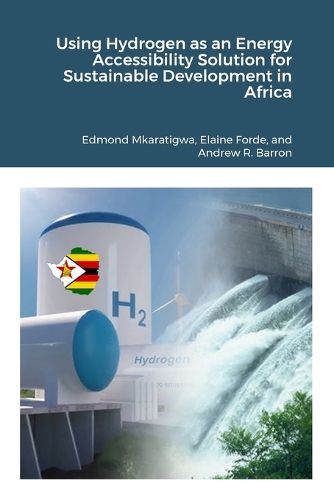Readings Newsletter
Become a Readings Member to make your shopping experience even easier.
Sign in or sign up for free!
You’re not far away from qualifying for FREE standard shipping within Australia
You’ve qualified for FREE standard shipping within Australia
The cart is loading…






This title is printed to order. This book may have been self-published. If so, we cannot guarantee the quality of the content. In the main most books will have gone through the editing process however some may not. We therefore suggest that you be aware of this before ordering this book. If in doubt check either the author or publisher’s details as we are unable to accept any returns unless they are faulty. Please contact us if you have any questions.
The aim is to assess possibilities for the implementation of hydrogen as an energy innovation and accessibility solution for sustainable development in Africa. Hydrogen as a fuel presents opportunities for tackling climate change. Continuous refinement and advancement of existing inventions and materials for reducing greenhouse gas emissions towards carbon neutrality should therefore be guaranteed. Findings from the remote Mkaratigwa Village corroborated the observation that there existed intense depletion and disruption of forests and ecosystems, revealing the need to embrace green hydrogen energy technologies for reducing carbon footprint and prevailing energy poverty mostly already afflicting girls, women and children. Work has to continue to ensure hydrogen energy satisfies the Sustainable Development Goal 7 criteria that encompasses affordability, reliability, sustainability and accessibility. Much more work remains on reducing barriers and motivating opportunities and enablers for improved embraceability of the technology in Zimbabwe and developing countries across the world. Production of hydrogen has nevertheless been reduced due to public policy shifts amid intermittent power supply and acute outages. Cost of grid power supply was impacting negatively on hydrogen production and more-so on its greening. Worldwide, renewable cleaner energy technologies including for hydrogen, are proved to be largely concentrated in the global North. Ironically to the contrary, critical mineral resources and materials that constitute the bulk of feedstock for brands original equipment manufacturers and suppliers, originated from Africa.
$9.00 standard shipping within Australia
FREE standard shipping within Australia for orders over $100.00
Express & International shipping calculated at checkout
This title is printed to order. This book may have been self-published. If so, we cannot guarantee the quality of the content. In the main most books will have gone through the editing process however some may not. We therefore suggest that you be aware of this before ordering this book. If in doubt check either the author or publisher’s details as we are unable to accept any returns unless they are faulty. Please contact us if you have any questions.
The aim is to assess possibilities for the implementation of hydrogen as an energy innovation and accessibility solution for sustainable development in Africa. Hydrogen as a fuel presents opportunities for tackling climate change. Continuous refinement and advancement of existing inventions and materials for reducing greenhouse gas emissions towards carbon neutrality should therefore be guaranteed. Findings from the remote Mkaratigwa Village corroborated the observation that there existed intense depletion and disruption of forests and ecosystems, revealing the need to embrace green hydrogen energy technologies for reducing carbon footprint and prevailing energy poverty mostly already afflicting girls, women and children. Work has to continue to ensure hydrogen energy satisfies the Sustainable Development Goal 7 criteria that encompasses affordability, reliability, sustainability and accessibility. Much more work remains on reducing barriers and motivating opportunities and enablers for improved embraceability of the technology in Zimbabwe and developing countries across the world. Production of hydrogen has nevertheless been reduced due to public policy shifts amid intermittent power supply and acute outages. Cost of grid power supply was impacting negatively on hydrogen production and more-so on its greening. Worldwide, renewable cleaner energy technologies including for hydrogen, are proved to be largely concentrated in the global North. Ironically to the contrary, critical mineral resources and materials that constitute the bulk of feedstock for brands original equipment manufacturers and suppliers, originated from Africa.